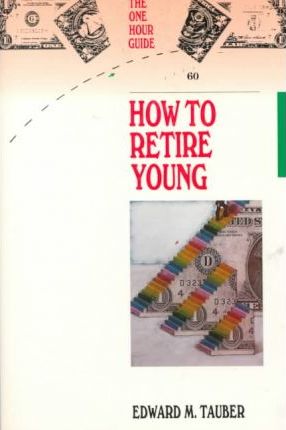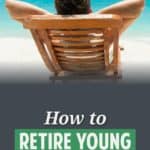How to retire young


While browsing Oregon’s best used bookstore earlier this year, I stumbled on a 1989 book called How to Retire Young by Edward M. Tauber. Tauber retired at the age of 43 from a tenured full professorship as Professor of Marketing at the University of Southern California. He’s written a number of marketing textbooks, but this was his first (and only?) foray into the realm of personal finance.
How to Retire Young is one of the oldest books I’ve found on the subject of early retirement. It’s fun to see how much of the modern financial independence movement is foreshadowed in the book’s pages.
It’s also fun to see how closely How to Retire Young adheres to my own “get rich slowly” philosophy. “Much [financial advice] is oriented toward the quick buck,” writes Tauber, “taking paths that often have a low probability. In short, you might as well play the lottery.”
Tauber has a different philosophy. He urges readers to “take the high road”. He wants them to follow the path with the greatest odds of success, even if that path might not lead to quick wins. He also cautions that “there’s no best way for everyone”, just as I say “do what works for you“. There are certainly best practices and mathematically optimal options, but there aren’t any right options.
You Can Retire Young
Tauber’s premise is that many people can retire early — if they plan and remain dedicated to the plan. He writes:
“If you want to retire early, there are no magic formulas. It requires hard work to make money and requires smart work to learn how to invest on a pretax basis. If you invested 15 to 20 years in school to learn how to make money, why not spend a little effort to plan how to capitalize on your earning power to be able to enjoy it for a third of your life on your terms in early retirement?”
“Think of life has having three periods: schooling, working, and savoring,” he says. Most folks spend the first 20 to 25 years of life in school, work for 40 to 50 years, then leave what’s left for “savoring”. He suggests shifting our perspective. “Why not plan life in three equal installments?” he asks. Spend 25 years in school, work for 25 years, then savor another 25 years — or more.
The issue, as you know, is that there are trade-offs. The opportunity cost of retiring young is the stuff you could have had (and the things you could have done) during your working years. “Early retirement is like anything else that you can purchase,” Tauber writes. You probably won’t have as much discretionary income while you’re saving or when you retire, but you will have the time to enjoy what you do have.”
Tauber says the reason most people don’t retire early is they don’t think it’s possible. More than that, they’re not willing to wait to spend their money. They want to spend it now. They’re working hard, earning money, and they feel like they deserve to indulge themselves.
What’s more, the average person “cannot visualize the possibility that [work] might slow or stop”. People fall victim to the forever fallacy. As a result, they get trapped in what Tauber calls the work-spend cycle.
When you want everything now, you get it now — but that means exactly what it implies: having it now, not later. “It’s a prescription for a lifetime of work and spend,” Tauber warns. It’s also a prescription for living on less when you’re older. If you want money now and later, you have to plan for it. You have to want it badly or it won’t happen. And “if you want to retire early, you have to do it yourself, using the system to your best advantage.”
How to Retire Young
Tauber believes there are four steps to early retirement planning. Each of these requires both action and dreaming. The dreams give you the motivation, and the action makes it happen. You can’t retire young without both. (Well, I suppose you can, but without the dreaming aspect, what’s the point?)
Tauber’s four steps are actually a little confusing. My more organized version looks like this:
- Draft a “retirement lifestyle scenario”. Tauber offers an exercise similar to one I use in my workshops: “Assume you will retire next week. You are 55 years old and have 30 years of life expectancy. What will you do? Where will you live? How will you spend your time? Will you work? Will you move?” He urges readers to write a detailed two-page story to flesh out their dreams and desires. Think about what you’ll do in a typical day, month, or year during retirement.
- Calculate how much you’ll need then. When you’re finished your retirement lifestyle scenario, set it aside for a few days; after that break, make revisions. Next, figure out how much money you’d need (in today’s dollars) to support this lifestyle each year. Take as much time as you need to research this in depth. Come up with a realistic number.
- Calculate how much you have now. Your next step is to conduct what Tauber calls a “financial audit”. He wants you to calculate your net worth and do things like check your estimated Social Security benefits. If you were to retire today, how much annual income would you have?
- Develop a plan to close the gap between future needs and current means. Finally, figure out how to bridge the gap between what you have now and what you need in the future. Say, for example, that you estimate that your ideal lifestyle would cost $5000 per month but you only have enough saved to support $2000 per month. The gap you need to close is $3000 per month (or $36,000 per year).
Most of How to Retire Young details strategies for closing the gap between future needs and current means. A lot of what Tauber suggests has become outdated in the past thirty years, but some of his advice is still spot-on.
He is a huge proponent, for instance, of managing your career for greater income. He’s very blunt in this regard: If you don’t earn it, you can’t save it. You won’t retire young by making minimum wage.
“If you make more income,” he writes, “you can retire that much younger and, therefore, that much more quickly.” He continues:
“Most people make a critical mistake in career planning. They do not try to maximize their lifetime income. They may say that they want to get ahead or make more money, but they don’t look at their working life to see how that can happen.”
Tauber says that you should never take a job unless it increases your value and marketability to others. Other points of advice include:
- Evaluate every job to determine what skills you can learn that will prove useful (valuable and in-demand) in the future.
- Identify critical needs of employers in your field, the things that they think are important. Become an expert at these things.
- Assess your personal strengths and weaknesses. Look for a skill that you have that might allow you to do something better than others can.
- Make sure that what you are learning — in school and on the job — will be in high demand from companies and customers.
In other words, take the long view with your career. Most people only look at the short term. As a result, they might take a position that pays more today but has no future. Tauber wants readers to have a plan for their career, and to pursue that systematically so they can earn as much money as possible.
As you earn money, save it. “The key to early retirement is nothing magical,” Tauber writes. “It involves the three saves: save early, save more, save smart.”
- Saving early means starting now, if you haven’t already. Seriously: Make it a top priority. If you want to retire young, you need to take advantage of the power of compounding. Above all, compounding requires time.
- Saving more is all about boosting your saving rate, the percentage of your income that you save. How much should you save? Tauber recommends 10% of your take-home, as do many other money pros. I think you should aim higher. Twenty percent is great. More is better. (Take a gander at the shockingly simple math behind early retirement for more on this subject.)
- Saving smart means investing your money wisely and taking advantage of tax breaks, employer-sponsored retirement accounts, and so on. (Want to learn more? Here’s my quick guide on how to invest.)
Tauber formally recommends something that I’ve done accidentally. He says that many early retirees can benefit from saving two pools of money, one for the short term and one for the long term. The long-term money include tax-advantaged retirement accounts that you don’t want to touch until you turn 59-1/2. The short-term accounts contain the money you’ll need until then.
I’ve only recently realized that I inadvertently set myself up with two pools of money. I have my IRAs and my 401(k) that I’ll access once I turn sixty. These currently have a balance of about $500,000. For the next ten years, I need to live off my regular taxable investment accounts. These currently contain $300,000. When you consider that I have to pay capital gains taxes whenever I draw from my taxable accounts, that’s not really enough to last the next ten years!
The Bottom Line
One of my money nerd specializations is the history of retirement. Sad but true, I read about the topic in my spare time. I’m gradually building a library of books and articles about retirement — especially early retirement. I think a lot about the evolution of retirement, the types of retirement, and even the definition of retirement. (I told you I’m a money nerd!)
What makes How to Retire Young special is that it’s one of the oldest books I’ve been able to find on the subject of early retirement and financial independence. (For those who are new around here, these two terms are essentially the same thing. We often say “financial independence”, though, to keep people from arguing about what retirement is and is not.)
Today, financial independence and early retirement (sometimes abbreviated FI/RE) are the hot topic in the world of personal finance. There are scores of FI/RE blogs. There are FI/RE podcasts. There’s even a film about FI/RE scheduled to come out later this year. But in 1989, this was a new topic.
When How to Retire Young was published:
- The four-percent rule for safe retirement withdrawals hadn’t yet been formalized.
- Your Money or Your Life had not yet been published.
- Hell, Mr. Money Mustache couldn’t yet grow facial hair in 1989!
In fact, the only FI/RE book I know of that predates How to Retire Young is Paul Terhorst’s 1988 classic, Cashing In on the American Dream [my review].
I wish I could say that How to Retire Young is a great book. Sadly, it’s not. It’s good (don’t get me wrong), but it suffers from being first. Nowadays we have robust theories and systems to support early retirement. In 1989, Tauber was inventing things as he went along. As a result, some of his number-crunching is needlessly convoluted. Worse (to me), the book itself sometimes seems sloppy and poorly edited.
Because of this — and because it was written thirty years ago — I don’t recommend How to Retire Young for the average person. (I’ve done my best to summarize the best bits here so you don’t have to track it down.) If you’re a money nerd, fine. Read it. It’s only going to cost you a couple of bucks, and you’ll get a fun glimpse at the early days of early retirement theory.
Become A Money Boss And Join 15,000 Others
Subscribe to the GRS Insider (FREE) and we’ll give you a copy of the Money Boss Manifesto (also FREE)

